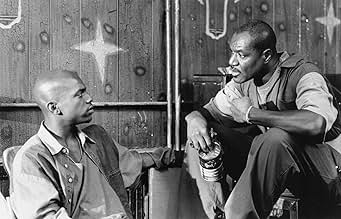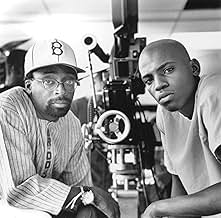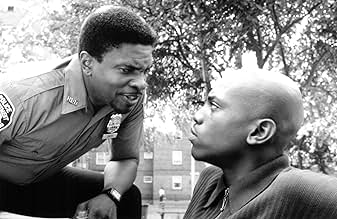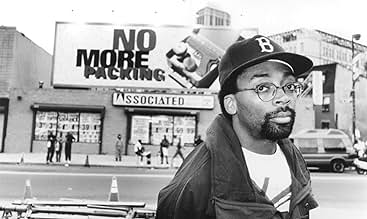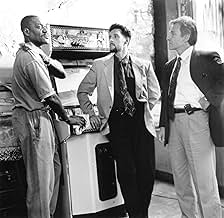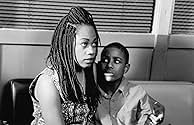De jeunes trafiquants de drogue dans les quartiers de Brooklyn mènent une vie dure et dangereuse, pris au piège entre les injonctions de leurs supérieurs et la traque des inspecteurs qui che... Tout lireDe jeunes trafiquants de drogue dans les quartiers de Brooklyn mènent une vie dure et dangereuse, pris au piège entre les injonctions de leurs supérieurs et la traque des inspecteurs qui cherchent à les arrêter.De jeunes trafiquants de drogue dans les quartiers de Brooklyn mènent une vie dure et dangereuse, pris au piège entre les injonctions de leurs supérieurs et la traque des inspecteurs qui cherchent à les arrêter.
- Récompenses
- 6 nominations au total
- Tyrone
- (as Pee Wee Love)
- Errol Barnes
- (as Tom Byrd)
- Go
- (as Fredro)
- Horace
- (as E.O. Nolasco)
- Sharon
- (as Lisa Arrindell Anderson)
Histoire
Le saviez-vous
- AnecdotesWas originally supposed to be directed by Martin Scorsese. Rocco Klein would have been the main character, played by Robert De Niro. Scorsese changed his mind, opting instead to direct Casino (1995), and De Niro went with him. Scorsese then asked Spike Lee if he wanted to direct. Lee accepted (and decided that Strike, not Rocco, would be the primary character), and Scorsese was given an "Executive Producer" credit.
- GaffesWhen Detective Mazilli is walking up to the back of the Mercedes Benz to talk to the kids inside his badge/shield is that of an NYPD Detective. However when he shows it to the driver of the car it is the shield of a NYPD Sergeant.
- Citations
Rodney: If God created anything better than crack cocaine, he kept that shit for hisself. I mean, that shit is like truth serum. It will truly expose who you are. I mean, you happen to be a low-life rat bastard motherfucker, who will sell off his newborn for a suck off that glass dick, crack will bring it right on in the light. Now, I don't care you black, white, Chinese, rich, poor. You take that first hit, you on a mission. And that mission will never end. Even when the house, the money, loved ones are gone, they send you to the joint, you still gonna try to cop.
Ronald 'Strike' Dunham: No doubt.
Rodney: Only time it ends, Strike, that mission, when you six feet under.
- ConnexionsFeatured in Crooklyn Dodgers: Return of the Crooklyn Dodgers (1995)
Clockers has a main plot that pushes along, as the murder by multiple gun-shots of a Darryl, black fast-food worker, who was also apart of the crew of Rodney (Delroy Lindo), call into question who might have done it. At first, it seems pretty open and shut, as Victor (Isaiah Washington) comes forth and admits he did it in self-defense. Rocco Klein (Harvey Keitel) doesn't buy it, seems too easy, so he asks around, digs deeper, and sees that his brother, Strike (Mekhi Pfeifer) seems to be much more of the guilty party, by way of how he handles himself in the streets, his repore with Rodney, and as having more motive to kill Darryl. It's through this that Lee then branches it out to make it as much as character as about plot, where the ties between certain characters, like Strike and Tyrone, a pre-teen who looks up to Strike like a surrogate father, are mostly defined by how the neighborhood works out in the open. The clockers are bunch of would-be gang-bangers who talk a lot of talk, but haven't walked nearly as much as Earle, best friend of Rodney's and psychopathic murder, or Rodney himself, who has that veneer of being like the one you can trust the most- half surrogate father as well and half good cop/bad cop boss- until he gets crossed.
Although Price's material, which comes through with the energy and occasional wit, is noticeable throughout, it's really Spike Lee as director and many of the actors who make this a consistently watchable movie. Lee is never one to be too subtle with the camera, and he has variations with how he deals with the material to make it very observant but also subjective. Early on, for example, we see the clockers making their deals in the park in long-shot, shaky, as if Lee's filming it far away for a reality TV show. But then we also see the 360 degree camera moves as Klein questions Strike. There's many camera moves that are practically trademark Lee shots, especially with the lighting, as Klein questions Tyrone, or when we see a flashback to Victor having to deal with some clockers. It's all very flamboyant and meant to call attention to the material, and aside from a few unneeded music choices (it's the only time you'll hear Seal in a drug dealer crime movie), he's on top of things. Meanwhile, the performances are all top-notch, usually, as Keitel and particularly Lindo play their characters so well by pretty much being how we think the actors 'really' are, even though they're not. Pfeifer has a little trickier a time with his performance, because he usually is on a very similar note: I didn't do nothing, is his usual beat. His character also has the intriguing qualities that mark him as something of an outsider however in he might be: his stomach virus, which is never resolved but always looming over him, and his love of electric train-sets.
And all the while, Clockers succeeds in presenting a time and place where there should be little to no hope, and it makes the cops and criminals both pretty well-rounded when compared to other genre films. The cops are meant to be the good guys, but there's also a steady conflict between Klein and his partner: why should Klein care so much as to who did it or why (Strike also asks this question towards the end, in one of the best scenes in the film)? And Strike and Rodney are not cut-outs from black exploitation flicks, but with more of a push and pull tie that is always a threat, never a comfort. There are little details that help make Lee's film interesting when it veers into being like a television serial; the white yuppies who get entangled in the case; the over-protective but very smart cop (Keith David, always a pro) who also tries to play surrogate father to Tyrone, albeit without the same care, however negative, as Strike has; the brief shots of the drug addicts with their habits on display, as we only need to see it for less than a minute to get the nature of the bottom of the food chain, which is total despair. Lee's film, however, isn't really disparaging as it has moments of hope, yet a hope meant to be in understanding that there's no easy way out of all of this.
- Quinoa1984
- 18 avr. 2007
- Permalien
Meilleurs choix
Détails
Box-office
- Budget
- 25 000 000 $US (estimé)
- Montant brut aux États-Unis et au Canada
- 13 071 518 $US
- Week-end de sortie aux États-Unis et au Canada
- 4 463 560 $US
- 17 sept. 1995
- Montant brut mondial
- 13 071 518 $US
- Durée2 heures 8 minutes
- Couleur
- Mixage
- Rapport de forme
- 1.85 : 1
Contribuer à cette page



